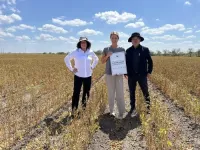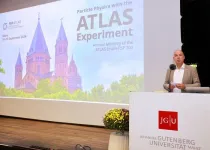(Press-News.org) Workplace communications platforms such as Slack and Microsoft Teams are sometimes accused of reducing productivity by distracting workers with constant messages and the need to respond to them.
But new research by Wen Wen, associate professor of information, risk, and operations management (IROM) at Texas McCombs, shows that companies can use them to do the opposite: to motivate workers.
How? By praising successful employees in all-staff channels that everyone can see — especially when they can’t see one another face-to-face.
“One important challenge faced by many companies is how to motivate remote workers and keep them productive,” says Wen. “Our research gives practical advice on how to construct the right messages regarding peers and how to share them on digital platforms in order to achieve a significant productivity gain.”
Power of Praise
Wen — with fellow IROM professor Andrew Whinston of Texas McCombs, Stephen He of The University of Texas at San Antonio, and Haoyuan Liu of Nanyang Technological University — scrutinized data from a Chinese internet technology company with 340 sales employees spread across 28 branches.
Whenever a sales representative landed a deal, human resources representatives would alert all branch workers on a Slack-like app. The notes were lengthy, individualized, and garnished with emojis.
The researchers classified the messages into two types: ones that praised employees’ efforts and ones that praised employees’ abilities. How would those messages affect the performance of other employees, as measured by the number of phone calls they made to prospective subscribers?
The team found both kinds of messages boosted overall productivity.
For a 10 percentage-point increase in the intensity of messages praising efforts, other workers averaged 0.9 more calls a day.
The same amount of increase in messaging about abilities inspired other workers to make 1.2 more calls a day.
Distance Makes a Difference
But the two kinds of messages had different effects, depending on whether other employees knew personally the ones being praised. Dividing relationships into “socially close” and “socially distant,” the study found:
Effort-focused notes boosted sales calls made by both close and distant colleagues, with no significant difference between them.
Ability-focused messages had strong motivating effects on close co-workers. For distant co-workers, however, call numbers were virtually unchanged.
The researchers got similar results from a second study, which surveyed 228 U.S. workers from a variety of companies.
Why did commending effort inspire more workers than commending ability? Wen points to prior psychological research.
People relate to another’s effort because they see it as controllable, actionable, and contributing to success, she says. “Individuals often exhibit heightened dedication when they perceive that the goals they pursue are more achievable.”
It’s a different story for ability-focused messages. People who are socially close see themselves as having similar abilities, and they work harder. But those who are distant are less likely to believe that they possess similar abilities or that they can acquire them anytime soon.
That’s a particularly important finding for companies with many remote workers, Wen notes. “They usually do not know each other due to the physical distance,” she says.
“For a distributed workforce, managers should probably consider crafting effort-focused messages when sharing peer successes, instead of ability-focused messages. People can be influenced by effort-focused messages about peers whom they don’t even know.”
“Peer Influence in the Workplace: Evidence from an Enterprise Digital Platform” is published in MIS Quarterly.
END
A new tack for slack: motivate workers
Managers can boost everyone’s productivity by praising successful workers in company-wide messaging
2024-09-12
ELSE PRESS RELEASES FROM THIS DATE:
UTA harvests first climate-smart soybean crop
2024-09-12
UT Arlington biologists, working with underserved farmers in South Texas, have harvested their first crop of climate-smart soybeans. This harvest is part of a four-and-a-half-year, $5 million project funded by the U.S. Department of Agriculture (USDA) to test whether climate-smart agricultural practices can reduce emissions of greenhouse gases (GHGs) responsible for climate change—including carbon dioxide, methane, and nitrous oxide—while simultaneously increasing crop production.
“We ...
JGU hosts annual meeting of the ATLAS Collaborative Research Center
2024-09-12
The connections between particles and their mass, the composition of the universe out of matter and antimatter and the search for previously unknown particles such as the so-called “dark matter” are the focus of researchers at the research center CERN in Geneva, which is celebrating its 70th birthday this year with events all around the world. In four large-scale experiments, scientists at the Large Hadron Collider (LHC) are getting to the bottom of the secrets of the universe. This particle accelerator offers researchers ...
Med school scientist receives prestigious NSF award for inflammation research
2024-09-12
Associate Professor Justine Tigno-Aranjuez will use a five-year grant of more than $1 million to study how influences on the production of lipid mediators to better understand impacts on inflammation.
A College of Medicine researcher has received a prestigious U.S. National Science Foundation CAREER Award to support her research into the cellular causes of inflammation, discoveries that could be pivotal for treating conditions like Crohn’s disease and arthritis.
Justine Tigno-Aranjuez’s lab has been researching lipid mediators — ...
Uptick in drug overdose rates is widely reported especially among young women
2024-09-12
Overdose rates in Colombia involving illegal opioids, hallucinogens, stimulants and sedative psychotropic medication increased greatly during 2018-2021, mainly caused by overdoses in young women, according to a study at Columbia University Mailman School of Public Health. Drug overdoses increased by 356 percent from 8.5 to 40.5 percent per 100,000 individuals from 2010 to 2021. The findings are published in the American Journal of Public Health.
The study is the first to describe national ...
Understanding what helps families with teens maintain household vaping bans
2024-09-12
UNIVERSITY PARK, Pa. — In the roughly 20 years since e-cigarettes were introduced in the United States, use among young people has grown substantially. By 2022, more than one in five high school seniors reported they had vaped nicotine in the past month.
Household smoking bans — rules against anybody smoking inside a home — are an effective tool for delaying or preventing teen cigarette smoking, according to Jennifer Maggs, professor of human development and family studies at Penn State, and her collaborators, so they examined if the same might hold true for vaping. They assessed how many households with teenage children in the ...
Can AI talk us out of conspiracy theories?
2024-09-12
Have you ever tried to convince a conspiracy theorist that the moon landing wasn’t staged? You likely didn’t succeed, but ChatGPT might have better luck, according to research by MIT Sloan School of Management professor David Rand and American University professor of psychology Thomas Costello, who conducted the research during his postdoctoral position at MIT Sloan.
In a new paper “Durably reducing conspiracy beliefs through dialogues with AI” published in Science, the researchers show that large language models can effectively reduce ...
‘Even the deepest of rabbit holes may have an exit’
2024-09-12
Embargoed: Not for Release Until 2:00 pm U.S. Eastern Time Thursday, 12 September 2024
‘Even the deepest of rabbit holes may have an exit’
Pathbreaking psychology study reveals conversations with AI models can reduce conspiracy theory beliefs
(WASHINGTON, D.C.) Sept. 12, 2024 – ‘They’re so far down the rabbit hole of conspiracy theories that they’re lost for good’ is common thinking when it comes to conspiracy theorists. This generally accepted notion is now crumbling.
In a pathbreaking research study, a team of researchers from American University, ...
An exit for even the deepest rabbit holes: Personalized conversations with chatbot reduce belief in conspiracy theories
2024-09-12
Personalized conversations with a trained artificial intelligence (AI) chatbot can reduce belief in conspiracy theories – even in the most obdurate individuals – according to a new study. The findings, which challenge the idea that such beliefs are impervious to change, point to a new tool for combating misinformation. “It has become almost a truism that people ‘down the rabbit hole’ of conspiracy belief are almost impossible to reach,” write the authors. “In contrast to this pessimistic view, we [show] that a relatively brief conversation with a generative AI model can produce ...
How is open access transforming science communication?
2024-09-12
In a Policy Forum, Mark McCabe and Frank Mueller-Langer explore how new open access (OA) mandates and agreements are changing how scientists share their work. They outline key contemporary unknowns in the open access landscape, as well as avenues for continued research. Since 2003, many national governments and international organizations have supported the Berlin Declaration on Open Access (OA) to Knowledge. More recently, some governments and organizations have introduced mandates to ensure open access ...
US food waste bans fail to reduce landfill waste, except in Massachusetts
2024-09-12
State-level bans on commercial organic waste disposal have largely failed to reduce landfilled waste across the U.S., with one state standing out as the lone success, according to a new study. Massachusetts alone achieved a significant reduction in landfilled waste when it implemented food waste bans. The findings underscore the importance of well-designed and enforced policies, with Massachusetts offering a potential model for effective waste management. “Our study shows that food waste bans are far from guaranteed to be successful,” ...
LAST 30 PRESS RELEASES:
Black soldier fly larvae show promise for safe organic waste removal
People with COPD commonly misuse medications
How periodontitis-linked bacteria accelerate osteoporosis-like bone loss through the gut
Understanding how cells take up and use isolated ‘powerhouses’ to restore energy function
Ten-point plan to deliver climate education unveiled by experts
Team led by UC San Diego researchers selected for prestigious global cancer prize
Study: Reported crop yield gains from breeding may be overstated
Stem cells from human baby teeth show promise for treating cerebral palsy
Chimps’ love for crystals could help us understand our own ancestors’ fascination with these stones
Vaginal estrogen therapy not linked to cancer recurrence in survivors of endometrial cancer
How estrogen helps protect women from high blood pressure
Breaking the efficiency barrier: Researchers propose multi-stage solar system to harness the full spectrum
A new name, a new beginning: Building a green energy future together
From algorithms to atoms: How artificial intelligence is accelerating the discovery of next-generation energy materials
Loneliness linked to fear of embarrassment: teen research
New MOH–NUS Fellowship launched to strengthen everyday ethics in Singapore’s healthcare sector
Sungkyunkwan University researchers develop next-generation transparent electrode without rare metal indium
What's going on inside quantum computers?: New method simplifies process tomography
This ancient plant-eater had a twisted jaw and sideways-facing teeth
Jackdaw chicks listen to adults to learn about predators
Toxic algal bloom has taken a heavy toll on mental health
Beyond silicon: SKKU team presents Indium Selenide roadmap for ultra-low-power AI and quantum computing
Sugar comforts newborn babies during painful procedures
Pollen exposure linked to poorer exam results taken at the end of secondary school
7 hours 18 mins may be optimal sleep length for avoiding type 2 diabetes precursor
Around 6 deaths a year linked to clubbing in the UK
Children’s development set back years by Covid lockdowns, study reveals
Four decades of data give unique insight into the Sun’s inner life
Urban trees can absorb more CO₂ than cars emit during summer
Fund for Science and Technology awards $15 million to Scripps Oceanography
[Press-News.org] A new tack for slack: motivate workersManagers can boost everyone’s productivity by praising successful workers in company-wide messaging

